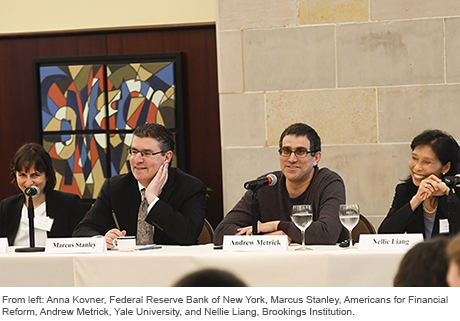Have the Biggest U.S. Banks Become Less Complex?

The global financial crisis, and the ensuing Dodd-Frank Act, identified size and complexity as determinants of banks’ systemic importance, increasing the potential risks to financial stability. While it’s known that big banks haven’t shrunk, the question that remains is: have they simplified? In this post, we show that while the largest U.S. bank holding companies (BHCs) have somewhat simplified their organizational structures, they remain very complex. The industries spanned by entities within the BHCs have shifted more than they have declined, and the countries in which some large BHCs have entities still include numerous “secrecy” or tax-haven locations.
New Report Assesses Structural Changes in Global Banking

The Committee on the Global Financial System, made up of senior officials from central banks around the world and chaired by New York Fed President William Dudley, recently released a report on “Structural Changes in Banking after the Crisis.” The report includes findings from a wide-ranging study documenting the significant structural adjustments in banking systems around the world in response to regulatory, technological, and market changes after the crisis, while also assessing their implications for financial stability, credit provision, and capital markets activity. It includes a new banking database spanning over twenty-one countries from 2000 to 2016 that could serve as a valuable reference for further analysis. Overall, the study concludes that the changed regulatory and market environment since the crisis has led banks to alter their business models and balance sheets in ways that make them more resilient but also less profitable, while continuing their role as intermediaries providing financial services to the real economy.
The ‘Banking Desert’ Mirage

Donald P. Morgan, Maxim L. Pinkovskiy, and Davy Perlman Editor’s note: The original version of this post misstated the share of the population that is unbanked for several states. The table, interactive chart, and related text have been corrected. These changes did not alter our conclusion that across states, the share of the population that […]
The Cost and Duration of Excess Funding Capacity in Tri‑Party Repo

In a previous post, we showed that dealers sometimes enter into tri-party repo contracts to acquire excess funding capacity, and that this strategy is most prevalent for the agency mortgage-backed securities (MBS) and equity asset classes. In this post, we examine the maturity of the repos used to pursue this strategy and estimate the associated costs.
Excess Funding Capacity in Tri‑Party Repo
At the New York Fed: Twelfth Annual Joint Conference with NYU‑Stern on Financial Intermediation

Anyone who has a savings account, has taken out a mortgage, or has been part of a business seeking new capital has relied on the smooth functioning of the institutions and markets that collectively perform financial intermediation. Because financial intermediation is so critical to the functioning of a modern economy, it is important to understand its inner workings—its fundamental features, recent innovations, and lines of transmission to real economy activity, as well as its imperfections and its interactions with regulatory policies. As part of an ongoing effort to foster such an understanding, the Federal Reserve Bank of New York recently hosted the twelfth annual Federal Reserve Bank of New York–New York University, Stern School of Business Conference on Financial Intermediation. In this post, we explore some of the discussions and findings from the May 10 conference, which focused on recent advances in the study of financial intermediation.
Money Market Funds and the New SEC Regulation
What Do Banks Do with All That “Fracking” Money?
Banks play a crucial role in the economy by channeling funds from savers to borrowers.
The Fragility of an MMF‑Intermediated Financial System
Since the financial crisis of 2007-09—and, in particular, the run on prime money market funds (MMFs) in September 2008—policymakers have been concerned that the funds’ fragility may render banks themselves more susceptible to risk.
Intermediary Leverage Cycles and Financial Stability
The financial crisis of 2007-09 highlighted the central role that financial intermediaries play in the propagation and amplification of shocks.













 RSS Feed
RSS Feed Follow Liberty Street Economics
Follow Liberty Street Economics